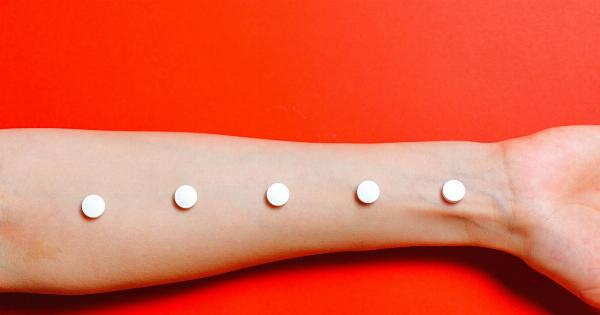Atopic dermatitis, also known as eczema, is a chronic skin condition that causes dry, itchy, and red patches on the skin. It’s a very common condition, affecting millions of people worldwide.
Atopic dermatitis can affect people of all ages, but it usually starts in childhood. While the exact cause of atopic dermatitis is unknown, researchers believe that it’s linked to an overactive immune system and a malfunctioning skin barrier.
In this article, we’ll explore the symptoms of atopic dermatitis and the various causes that can trigger this skin condition.
Symptoms
The symptoms of atopic dermatitis can vary from person to person, but they typically include:.
- Dry, itchy, and scaly skin
- Red patches on the skin
- Bumps on the skin that may leak fluid
- Thickened, cracked, or leathery skin
- Darkening of the skin around the affected areas
- Sensitivity to certain fabrics, soaps, and detergents
The severity of the symptoms can also vary depending on the individual. Some people may experience mild symptoms, while others may have severe symptoms that affect their quality of life.
It’s also common for atopic dermatitis to flare up periodically, meaning that the symptoms can come and go over time.
Causes
While the exact cause of atopic dermatitis is unknown, researchers believe that it’s linked to both genetic and environmental factors. Here are some of the common causes that can trigger this skin condition:.
Genetics
People with a family history of atopic dermatitis are more likely to develop the condition. Researchers have identified certain genes that can increase the risk of developing atopic dermatitis.
In fact, studies have shown that if one parent has atopic dermatitis, their child has a 50% chance of inheriting the condition.
Environmental factors
Environmental factors can also trigger atopic dermatitis. These include:.
- Dry and cold weather
- Exposure to certain fabrics, soaps, and detergents
- Exposure to allergens such as pet dander, dust mites, and pollen
- Stress and anxiety
- Certain foods, such as dairy, eggs, and soy
While these factors can trigger the condition, it’s important to note that they don’t cause atopic dermatitis directly. Instead, they can make the symptoms worse or trigger a flare-up.
How Atopic Dermatitis Affects the Skin and Body
Atopic dermatitis not only affects the skin, but it can also have an impact on the body as a whole. Here are some of the ways atopic dermatitis can affect the skin and body:.
Skin inflammation
Atopic dermatitis causes inflammation in the skin, which can lead to redness, swelling, and itching. In some cases, the skin may become so inflamed that it starts to crack and bleed.
Itching and scratching
The itching and scratching that come with atopic dermatitis can be very intense and can disrupt sleep and daily activities.
Persistent scratching can also cause the skin to become more inflamed and can introduce bacteria into the skin, leading to infections.
Psychological impact
Living with atopic dermatitis can be challenging and can impact a person’s mental health. The persistent itching and discomfort can lead to anxiety, depression, and social isolation.
Treatments
While there is no cure for atopic dermatitis, there are treatments available that can help alleviate the symptoms. Here are some of the common treatments used for atopic dermatitis:.
Moisturizers
Using a moisturizer regularly can help keep the skin hydrated and prevent dryness, which can exacerbate the symptoms of atopic dermatitis.
Topical corticosteroids
Topical corticosteroids are anti-inflammatory medications that can reduce redness, swelling, and itching. These medications are applied directly to the skin and are available in various strengths and forms.
Immunomodulators
Immunomodulators are medications that work by modulating the immune system and reducing inflammation in the skin. These medications are available in the form of ointments and creams.
Antihistamines
Antihistamines are medications that can help reduce itching and can promote better sleep. These medications are available over-the-counter and can be taken orally.
Conclusion
Atopic dermatitis is a chronic skin condition that can cause a lot of discomfort and disrupt daily life. While the exact cause of atopic dermatitis is unknown, researchers believe that it’s linked to both genetics and environmental factors.
By understanding the symptoms and triggers of atopic dermatitis, people with the condition can take steps to manage their symptoms and improve their quality of life.































